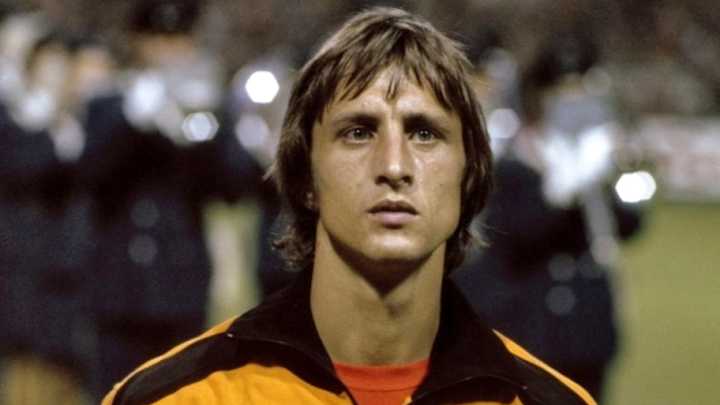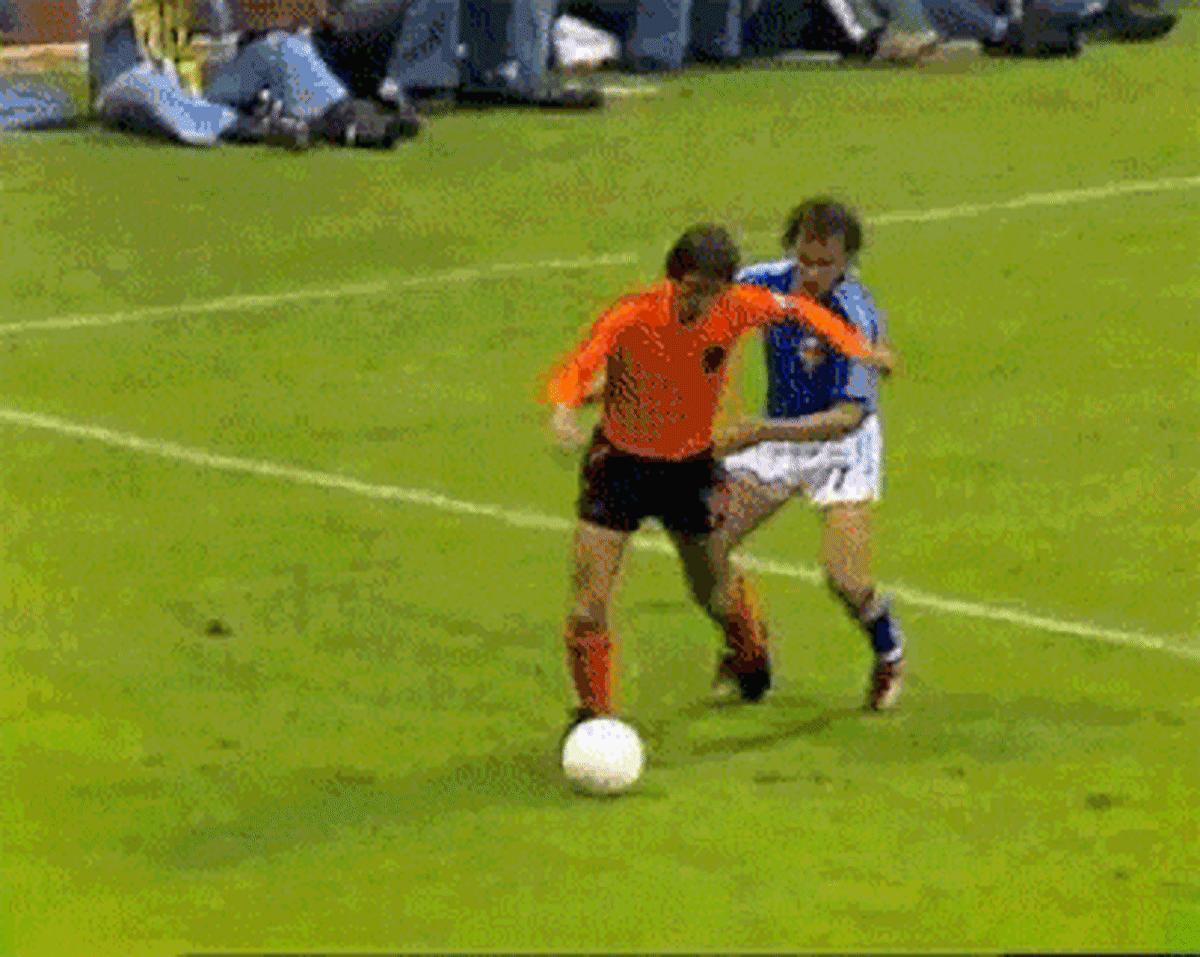World Cup Countdown: 11 Weeks to Go - What Made Johan Cruyff, Hero of 1974, the Greatest of All Time

Johan Cruyff left this world at the age of 68 in 2016 after losing his battle with lung cancer.
"Football has lost a man who did more to make the beautiful game beautiful than anyone in history," former England and Barcelona striker Gary Lineker, who played under the Dutch master at Camp Nou, tweeted upon hearing the sad news.
Pele and Diego Maradona are the greatest of all time. Cristiano Ronaldo and Lionel Messi will join them on that pedestal, if they haven't already. But Cruyff was more. He was not only an exceptional player, but a top coach, a shrewd tactician, an intelligent thinker and a genuine pioneer, whose lasting influence on the sport will still be felt for many years to come.
Born in Amsterdam in 1947, Cruyff joined the youth ranks at Ajax at the age of 10 at a time when football, even at the highest level, was still an amateur sport in the Netherlands. The professional era began in 1954, but even when a young Cruyff was establishing himself as a star in the late 1960s, amateur players were still very prevalent.
Cruyff was just 17-years-old when he made his senior debut for Ajax in November 1964. In his first full season with the first-team a year later, the teenager scored 16 times in 19 Eredivisie games and collected the first of seven Dutch titles he would win in the next eight seasons.
In 1969, he was part of the first Dutch team to contest the European Cup final as Ajax were soundly beaten by AC Milan. A year later, Feyenoord took the honour of being the first Dutch club to win it, but as Dutch football began to flourish, Cruyff steered Ajax to three straight continental titles of their own in 1971, 1972 and 1973.
Ajax have announced the Amsterdam ArenA will officially become known as the Johan Cruyff ArenA from the beginning of next season. pic.twitter.com/H14IQE1e2w
— Football Manics (@footballmanics) April 5, 2018
After that third European triumph, he joined Barcelona in a world record deal for the equivalent of £922,000. Barça hadn't won La Liga since 1960, but that drought ended in Cruyff's first season. He quickly settled into life in Spain, even giving his first son, who was born in February of that debut 1973/74 campaign, the distinctly Catalan name, Jordi.
Cruyff remained with Barça until 1978, at which point he made the leap to the United States to join the likes of Pele, Franz Beckenbauer and George Best in the glitzy North American Soccer League (NASL), playing for Los Angeles Aztecs and Washington Diplomats. He briefly returned to Spain in 1980 to join Levante, having come close to signing for Leicester City in England, before a second spell at Ajax from 1981 to 1983, and a controversial final season at fierce rivals Feyenoord.
Cruyff's international career for the Netherlands had begun in late 1966, just under two years after playing his first game for Ajax. Having competed at the 1934 and 1938 World Cup tournaments, the Dutch declined to even participate in 1950 and 1954 after the Second World War and then failed to qualify in 1958, 1962 and 1966.
Even with Cruyff, the Oranje were also absent from the 1970 tournament, and did not make the final bracket at Euro' 72. But with Ajax and Feyenoord among the best club sides in Europe in the decade, the Netherlands would not be denied their place at the 1974 World Cup in Germany - 13 members of the 22-man squad named by Rinus Michels came from those two teams alone.
Michels had been Cruyff's coach at Ajax, departing for Barcelona after the first European Cup triumph in 1971. They would again link up when Cruyff arrived in Spain two years later, with Michels agreeing to also take charge of the national team for the 1974 World Cup.
Former Ajax player Rinus Michels, coach of the Netherlands at the 1974 FIFA World Cup. And later also at UEFA Euro 1988. pic.twitter.com/XeTHdbq7Lz
— Holland74 🇳🇱 (@Netherlands1974) February 9, 2018
Together Cruyff and Michels were central to the emergence of 'Total Football', the fluid style of football that drew influence from the positional freedom and versatility of Hungary's 1954 'Magical Magyars', and moved the game on from the defensive-minded Italian Catenaccio that had steered Internazionale to back-to-back European Cups in the 1960s.
'Total Football' relied on the principle that every player in a team was technically skilled enough to perform every role, meaning that defenders, midfielders and forwards could interchange at will, often making it impossible for opposing teams to pick individual players up. Defensively, Ajax and later the national team would press from the front and use the offside trap as a weapon.
It governed the way the Cruyff and the Netherlands would play at the 1974 World Cup.
"The 'Total Football' the Dutch played that month in Germany was extraordinary," author David Winner wrote in 'Brilliant Orange: The Neurotic Genius of Dutch Football. "How could anyone have imagined and executed something so dazzling?"
The 1974 tournament put Cruyff on another level. Already a Ballon d'Or winner in 1971 and 1973 - he would go on to win a third after the World Cup, a record that wasn't bettered until Lionel Messi won his fourth in 2012. This was a superstar at his very best on the biggest stage.
A 0-0 draw against Sweden in the opening group stage isn't remembered for the score-line, but for the 'Cruyff Turn' that utterly bamboozled defender Jan Olsson. It was the first time the trick, feinting to play the ball to a team-mate before dragging it behind the standing leg instead, had been seen and it was marvellous. It was natural and spontaneous too, not the product of endless hours of practice.
For, as Cruyff noted in his posthumously published autobiography 'My Turn', "The idea came to me in a flash, because at that moment it was the best solution for the situation I was in."

Aside from his technical brilliance, his personality also stood out in Germany. Cruyff was sponsored by Puma and flatly refused to wear a shirt bearing the trademark three sleeve stripes of rival brand Adidas. The Dutch federation had little choice but to let their strong willed star do as he wished, so he was given his own unique shirt that featured just two stripes instead.
And those two stripes adorned a jersey that had number 14 on the back, the digits that Cruyff has become synonymous with over the last half a century. Michels had wanted squad numbers for the tournament to be assigned by alphabetical order, a not uncommon practice. It would have seen Cruyff given the number one shirt. But he insisted on having 14 and a concession was made, placing him in between Johan Neeskens and Rob Rensenbrink in the list.
The reason that Cruyff wore 14 in the era of strict 1-11 was another act of stubbornness and defiance. Early in his career, he had typically worn nine or 10, but prior to one game for Ajax in 1970, team-mate Gerrie Muhren couldn't find his usual number seven shirt. Cruyff gave his colleague his own and took another from the nearby kit basket, which turned out to be 14. Because Ajax won, he insisted on keeping it and the Dutch federation let him. Later on, Spanish officials weren't always as accommodating and he usually wore number nine at Barcelona.
1973. FC Barcelona against Atletico Madrid. That was when Johan Cruyff scored the most famous goal of his career, also dubbed as “The Phantom Goal”. pic.twitter.com/VfNSlNrp64
— Barça Insider (@theBarcaInsider) March 24, 2018
En-route to the 1974 World Cup final, Cruyff scored his first goals at the tournament in the second round group game against Argentina, netting a brace in a 4-0 win. He then scored a further goal in a 2-0 win over reigning champions Brazil that put the Dutch into the final against hosts West Germany.
It took just two minutes of the final for 'Total Football' to take over. Cruyff himself collected the ball as the deepest Dutch player and drove at the heart of the German defence. He was brought down in the penalty area and Neeskens scored from the spot to give the Dutch an early lead. It wouldn't last, however, with the Germans turning the game on its head before half time and claiming a slim 2-1 win.
A scandalous German tabloid exposé the day before the final had unsettled the Dutch squad after it was claimed that four un-named players had engaged in a naked pool party with local women. The title read 'Cruyff, Champagne and Naked Girls' and Cruyff apparently spent much of the night before the final on the phone explaining to his wife he was nothing to do with it.
Johan Cruyff has Beckenbauer on the run during 1974 world cup final. pic.twitter.com/CxupqjhSvB
— St.Anthony (@Stephen4_2) July 11, 2017
Cruyff didn't return to the World Cup in 1978. He had retired from international duty in 1977 upon helping the team qualify for the finals. At the time it was believed he was opposed to the military dictatorship in Argentina where the tournament was taking place, but many years later he confessed that his family had been the subject of an attempted kidnapping, prompting him to quit the national team so he could be at home more often.
After his playing days finished in 1984, Cruyff turned to coaching and was handed the reins at Ajax. He then returned to his adopted home in Barcelona in 1988 and created the 'Dream Team', largely using home-grown talent from the La Masia academy he himself had previously insisted the club invest in to deliver a first and long overdue European Cup to Camp Nou in 1992.
Cruyff's influence, drawing from the principles of 'Total Football', gave Barça an unmistakable identity that continues to flourish. The tiki taka the club is famed for evolved in La Masia, where every young player is taught the same way to play as Cruyff dictated. It is a philosophy. It is his philosophy. And it is why his legacy, beyond his status as one of the greatest players of all time, will continue to burn brightly for generations still to come.
